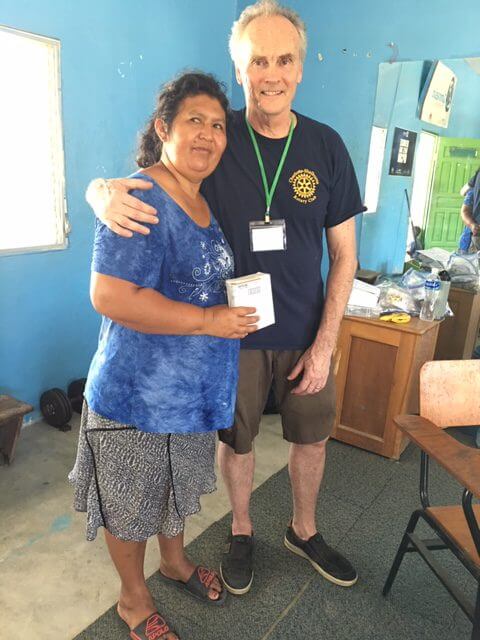Hands to Honduras-Tela in its fifteenth year

“When we arrive there there can be over 200 patients waiting to be seen,” explains Linda Gilbert, when describing the scene outside the make-shift exam room at a school in the town of Tela, in the northwest corner of Honduras.
During their four weeks of service the Hands to Honduras group, which grew out of a project launched by the Charlotte-Shelburne-Hinesburg Rotary, sees patients in the clinics set up in five different rural areas. “We respond to needs in the areas of women’s health, pediatric and family medicine, blood pressure issues, audiology, fluoride and reading glasses needs,” says Gilbert.
This year, in addition to the clinics, the volunteers, numbering in the 40s, many of whom are repeat travelers, completed construction of a postpartum unit in the Tela Hospital and began work on a nurse station at the unit. “Three thousand babies are born in this town each year,” explains Gilbert, “and there wasn’t enough room. There were times when there would be two mothers and two babies in one bed. Now there are four rooms with bathrooms and showers. Each can hold four women after they’ve given birth.”
This year was the second year that Dr. Keith Walsh, owner of Adirondack Audiology in Shelburne, volunteered his services. “We collect donated hearing aids and bring basic testing equipment,” he explains. “Last year there was a magic moment when a 17-year-old heard his voice for the first time.”
Why Honduras? “Honduras gets a bad rap in the news,” Gilbert says, “there is a lot of poverty and a high unemployment rate, but because we’ve made a long-term commitment to doing work there, we’ve come to understand the culture and we’ve formed many partnerships in-country.”
In addition to construction projects and medical services, the group also runs trainings and workshops. This year these included basic CPR for police and fire department members and a teen pregnancy prevention seminar. When asked what she loves about this work, Gilbert is quick to offer several answers: “I love seeing the babies in the NICU; how well organized it is now. It’s gratifying to see a project we launched taken over by the local population and run well.”
“We focus on the greatest needs, we see who will benefit the most from our work, and we do what we say we’re going to do, this is what has made the venture successful.”
For information about how you might participate in this humanitarian service trip, email Linda Gilbert.

